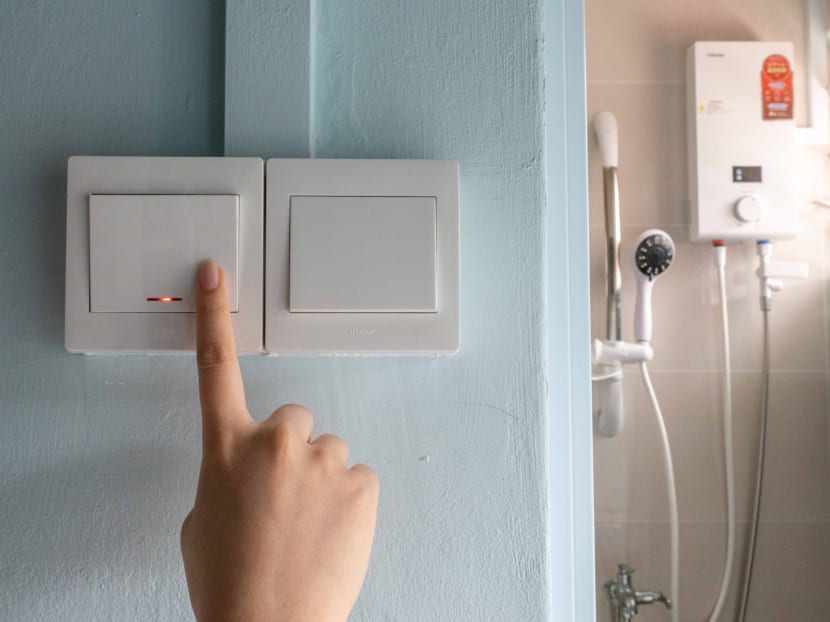'It won't get wet, it's fine': Some residents of older flats unaware, nonchalant about electrocution risk with water heaters
SINGAPORE — Out of concern for her family's safety, a plumber urged Madam Joy Sim's family to replace their ageing water heater two years ago, only for them to get an improperly installed one.

A double pole switch outside a bathroom being pressed for a water heater that is typically installed in public flats. Such switches should be used, electricians said, instead of a power socket for a standard three-pin plug often seen in other home appliances.
- Some residents in older flats appear nonchalant or unaware about how safe their water heaters are
- Improper installation can put people at risk of electrocution, an expert said
- Some users try to cut costs by installing their own water heaters or asking contractors to power water heaters using a regular socket
- Water heaters should have a separate power source with its dedicated water-heater switch, the Energy Market Authority said
- It should also be protected by a working residual current circuit breaker
SINGAPORE — Out of concern for her family's safety, a plumber urged Madam Joy Sim's family to replace their ageing water heater two years ago, only for them to get an improperly installed one.
A water heater in the bathroom of her home is powered via a cable that extends from the bathroom, terminating in a three-pin plug attached to a power socket in her kitchen. The set-up is similar to that seen in a case of electrocution involving a water heater heard in the coroner's court last week.
An elderly couple and their son were electrocuted in December 2020 after cables within the three-pin plug fused together over prolonged usage, which allowed the current to course through the trio, killing them. An expert witness testified that such a set-up is unsafe.
Speaking to TODAY over the past week, some residents living in older government-built flats, especially those built before a residual current circuit-breaker (RCCB) became mandatory in new homes from 1985, are unaware of how installing a water heater in such a manner could lead to a fatal tragedy.
Several of them also had improper instant water heaters set-ups. These water heaters are used for showers in the bathroom.
RCCBs are safety devices that cut off electricity supply upon detecting any electricity leakage from electrical appliances or electrical wirings.
Despite this, Mdm Sim, a 65-year-old retiree, is not concerned about any safety issue with her new water heater.
To her, this is safe enough because the water heater's power outlet is connected to the distribution board box and it was installed by a trusted handyman.
A distribution board box supplies electricity to different parts of the house while protecting homeowners through an installed fuse or circuit-breaker.
Mdm Sim lives with her husband and two children in a Housing and Development Board (HDB) flat in Hougang built in the early 1980s.
She said: "The plug isn't in the bathroom, so it won't get wet. It's fine since all our power points are connected to the distribution board box.
"If anything happens, the circuit-breaker will trip."
However, experts said that this could still be unsafe.
When interviewed by TODAY, Mr Chan Chee Hin, a licensed electrical engineer, said that Mdm Sim's water heater set-up — which uses a power socket instead of a double pole switch — puts her at risk of electrocution.
Testifying last week, an expert witness from the Energy Market Authority (EMA) said that the December 2020 accident would not have happened if a double pole switch with a standalone circuit was used. Such circuitry reduces the risk of the cables fusing together.
The expert witness also noted that the circuitry from which the water heater drew on was also not protected by an RCCB.
EMA told TODAY that homeowners are advised to buy water heaters with a safety mark and to ensure that it does not use a three-pin plug.
"During installation, ensure that the electrical water heater is connected to a separate power source with its dedicated water-heater switch.
"A water heater should not be connected to a wall socket or extension cord as it would become an electrical hazard due to its higher electrical load," the authority said.
In response to TODAY’s queries, HDB said that electrical components in flats are installed in compliance with the prevailing performance requirements under the Electricity Act and since 1985 the Act was updated to require all new homes built to be equipped with an RCCB.
“Home owners living in flats built before 1985 may have installed the RCCB as part of their own renovation,” said HDB.
“This is especially so for flats which have been sold or resold since 1985, when renovation and electrical rewiring works are carried out in the flat.”
It added that with all fittings and fixtures, RCCBs are subject to fair wear and tear over time.
"Hence, as part of their regular home maintenance, flat owners should also test their RCCB regularly to ensure that it is in good working condition," it said.
HDB added that homeowners who are unsure what an RCCB is or where it is located can contact any HDB Branch for advice.
Homeowners can also consider engaging a contractor for electrical works listed on the HDB InfoWEB.
UNAWARE ABOUT ELECTRICAL SAFETY
Cost was one of the reasons why residents chose to go with an unsafe option.
Some of them were also not aware of the safety risks, stating that they would not replace their water heaters unless it broke down.
Despite there being a higher risk of electrocution, one 60-year-old resident who wanted to be known only by her surname Lau trusts her six-year-old water heater because it "hasn't spoiled yet".
"We only replace once the water heater breaks down," the Telok Blangah resident said in Mandarin, adding that it would be costly to replace her water heater.
Her water heater is powered by a power outlet outside her toilet, similar to Mdm Sim's and the December 2020 case.
“If contractors connect the water heater to a nearby electrical circuit... they save costs for cables, trunking and labour... this will probably save homeowners between S$150 and S$300.Mr Chan Chee Hin, a licensed electrical engineer, on why some users may choose cost-savings over safety”
Mdm Sim's daughter Amanda Seah, 23, said that it took some convincing by the plumber before her parents were willing to change their 13-year-old water heater — which still worked — to a new one.
The plastic casing of the water heater had turned from white to yellow, Ms Seah said. "I was scared of using it."
Mr Chan said that homeowners sometimes try to cut costs by installing their own water heaters, or asking contractors to power water heaters using a regular power socket.
A properly installed water heater should take electrical supply directly from the home's electrical distribution board box, be controlled by a double pole water-heater switch and is protected by a working RCCB, he stressed.
"If contractors connect the water heater to a nearby electrical circuit... they save costs for cables, trunking and labour... this will probably save homeowners between S$150 and S$300," Mr Chan said.
Registered electricians who improperly install water heaters in such a way may face a revocation of their licence, since they are trained to avoid such set-ups.
TESTING THE CIRCUIT-BREAKERS
EMA told TODAY that homeowners should verify whether the person engaged is a licensed electrician before allowing the person to carry out electrical work in their homes.
Since 1985, it has been mandatory for all new homes to be installed with an RCCB, which was formerly known as earth leakage circuit-breakers, EMA said. These switchboard-like devices typically come with a button labelled "test".
"Homeowners living in flats built before 1985 are advised to check their electrical distribution board box to ensure it is installed with an RCCB," EMA said.
Mr Chan highlighted the importance of checking if the RCCB is working as intended, in order to protect appliances such as water heaters.
"Turn on your water heater and see if it is working. Then, press the test button on your RCCB. If your water heater turns off, it works," he added.
EMA said that these RCCB checks should be done every month. It added that it has distributed pamphlets guiding households to do so through their SP Group utilities bill last year.
Be that as it may, these constant checks that EMA recommends are not common practice.
Farrer Park resident Edmund Lee, 58, who is unemployed, said that maintaining safety at home is important for him because he lives with his elderly mother, but he never checks his RCCB to see if it works.
"My circuit-breaker trips when there is lightning, so it works... there's no need to do checks," Mr Lee said.











